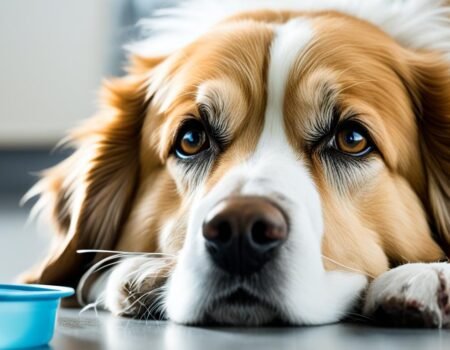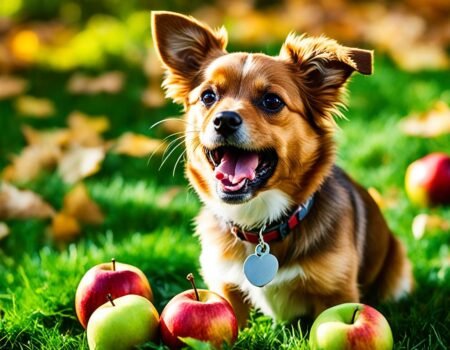Hey it’s Byron once again!! Did you know that nearly 45% of pets get anxious during fireworks or storms? The loud sounds and bright flashes scare many animals. “For crying out loud” As pet owners, we need to learn how to help our pets when they’re scared.
Key Takeaways:
- Behavior modification tips can help manage pet anxiety during fireworks or thunderstorms.
- Creating a safe haven and providing distractions can help your pet’s anxiety.
- Environmental tricks, such as blacking out rooms and providing background noise, can reduce the impact of noise and flashes.
- Exercising your pet and using distraction techniques can help calm them during these loud events.
- In severe cases you might have to call the vets for meds.
Understanding Pet Anxiety During Fireworks and Thunderstorms
Many dogs get scared during fireworks and thunderstorms. The loud and sudden noises freak them out. They might tremble, shake, howl, or bark. Dogs scared of thunder may also fear fireworks. This is because they are very sensitive to noise. Duh. Right😀😀😀
Pets think these sounds could mean danger. Wild animals get scared of storms to stay safe. But our pet dogs don’t face those wild dangers. Yet, they still feel scared during storms. Fireworks make many dogs scared because they sound like thunderstorms. They have loud bangs, strange noises, and bright flashes.
Knowing your dog is scared of thunder is key. Look for signs like panting, pacing, or even hiding. They might also have accidents inside or act aggressively toward other pets. We must comfort and help our dogs when they are scared. Never ignore or punish them for their fear. That’s not cool.
During fireworks or thunderstorms, it’s essential to create a safe and calm environment for your furry friend and offer them reassurance.
Tips for Creating a Safe Haven for Your Dog
Creating a safe spot for your dog is key to ease their anxiety during loud events. Setting up a comforting area helps your dog stay calm during fireworks or storms.
Choosing a Quiet Space
Look for a quiet spot in your house, away from windows and outside noise. A basement or big closet is great. Ensure it’s soundproof to keep out the noise from the outside.
Use their crate as a safe spot if your dog likes it. Make sure it’s cozy, with soft bedding and things they love. Add toys, treats, and something that smells like you to make it inviting. That’s not weird it works for me.
Providing Familiar Toys and Treats
To lower pet anxiety, give your dog their favorite toys and treats. Frozen treats or long-lasting chews work well. These keep them busy and distracted from the noise.
Masking Sounds with White Noise
Playing white noise like a fan, TV, or radio helps. It covers up the sound of fireworks and storms. This background noise makes a calming space for your dog.
Pro Tip: Playing dog-friendly classical music can help. Tunes from “Through a Dog’s Ear” are good for anxious dogs.
Comfort and Reassurance
Be with your dog during noisy events, or have someone they trust stay. Your presence is comforting. Calm them with slow, gentle pets along their body.
It’s important to make a safe haven for your dog to reduce their stress. These tips will help make a calming space for your dog to feel safe.
Exercise and Distraction Techniques to Calm Your Pet
To calm your pet during loud events like fireworks, exercise and distraction can help a lot. Here’s how to make them feel better:
1. Exercise for Anxious Pets
- Walk your pet before the noise starts.
- Keep them close on a leash to avoid them running off if scared.
- Being tired makes them less bothered by loud sounds.
2. Redirecting Your Pet’s Focus
- Train them to relax and pay attention when you ask.
- Use treats and toys they love during training for positive vibes.
- A head halter might help keep your dog calm and focused.
3. Distraction Techniques for Pet Anxiety
- Play games to keep their mind off the noise.
- Do things they love, like fetch or playing with special toys.
- Keeping them busy helps lower their stress.
Using these methods, you can help your pet find peace during noisy situations. Pets are different, so you might need to try a few things. What works for one might not work for another.
Environmental Measures to Reduce the Impact of Noise and Flashes
To help your pet during noisy events like fireworks or thunderstorms, there are several steps you can take. These methods aim to make a peaceful setting for your pet. They lessen their stress and worry.
Blacking out rooms for pets
Blacking out a room is a good strategy to lessen noise and light impacts. Use curtains or blackout blinds to make the room dark and calm. This blocks out scary flashes and lights, helping your pet feel safe during loud events.
Providing background noise for dogs
Background noise can also help comfort your dogs. It covers up scary sounds from outside. Playing soothing music or leaving the TV on can distract and calm your pet. These sounds offer a familiar noise that can make them less anxious.
Using anxiety wraps or pheromones for pets
Anxiety wraps and pheromone products can lower your pet’s anxiety during loud events. Products like Thundershirts apply gentle pressure to help them relax. Pheromone sprays, like Adaptil for dogs, give off calming scents to make pets feel secure. Using these with other steps can make the environment even more soothing.
Closing windows and doors
Shutting windows and doors can also reduce noise impact. It helps muffle loud sounds, making your pet less scared. This creates a quiet, safe space for them.
Arranging company for your dog
It’s comforting for dogs to have someone with them during scary times. Don’t leave them alone. Having a person nearby can calm and reassure them. This is especially true for pets that are closely attached to their owners.
Making a peaceful space is key for your pet’s well-being during fireworks or storms. You can do this by blacking out rooms, providing soothing sounds, using calming wraps or scents, closing up the house, and keeping them company. These steps create a safe and comforting environment for your pet.
Medication Options for Severe Anxiety
In some severe cases, pets might need medicine during loud events like fireworks or thunderstorms. It’s key to talk to a vet and follow their advice when giving medicine.
Sedatives can make a pet sleep or be less bothered by noise, but they don’t ease worry. Anti-anxiety medicine can reduce fear and panic, though they might not totally relax the pet.
For ongoing stress, antidepressants might help. They work over time and need to be given regularly.
On event days, quick-acting drugs can offer fast relief. But remember, medicine might not be enough on its own. Use it along with other ways to calm your pet.
Consider natural solutions too. Melatonin can aid in relaxation for some pets. Similarly, dog-appeasing pheromones can soothe them.
Always follow your vet’s advice and watch how your pet reacts to the medicine. Different pets might need changes to their treatment to feel calm.
“It is important to consult with a veterinarian and use medication under their supervision.”
Long-Term Management and Planning for Future Events
After the season of fireworks or thunderstorms ends, it’s key to focus on long-term care for your pet’s anxiety. Setting up a desensitization program is a good step. This lets pets slowly get used to the scary sounds in a safe way. By linking the sounds to happy rewards, pets can start to feel okay with them.
Finding more information and advice on how to do this can help. It’s a good idea to get help from a pet behavior expert or a skilled trainer. They can give special advice and make a plan that fits your pet’s needs.
Getting ready for future events with fireworks or storms is important for reducing pet anxiety. Making a safe place for your pet can really lower their fear. They should have a cozy spot to go to when they’re scared. Adding their favorite toys or blankets can make them feel better. Activities that keep their mind off the noise are good too, like puzzles or playing.
Stopping dogs from being afraid of loud sounds needs an active effort. Slowly helping your pet get used to these sounds and asking for expert help can control their anxiety. This improves their happiness and life quality.
Summary of Long-Term Management and Planning Tips:
- Implement a desensitization program to gradually expose your pet to loud noises in a controlled manner.
- Pair the exposure with positive experiences and rewards to associate the noises with positive outcomes.
- Seek professional help from a pet behavior consultant or trainer for expert guidance and personalized management plans.
- Create a safe environment with a comfortable and secure space for your pet to retreat to during loud noise events.
- Provide familiar toys, blankets, or comforting scents to help create a calming atmosphere.
- Engage in activities that distract and redirect your pet’s focus away from the noise.
Conclusion
It’s key to manage pet anxiety when there are fireworks or thunderstorms. You can help your pet feel better by modifying their behavior, making a cozy spot, giving them something else to focus on, and making your home more comforting. These steps will keep them calm and safe.
Never scold or punish your pet when they’re scared. This can make things worse. Instead, be supportive and understanding. If your pet is really struggling, talk to a vet. Sometimes, medicine is needed, and a vet can guide you on this.
Prepare for future noisy events with a plan to slowly get your pet used to the sounds. Not all pets are the same, so finding what works best might take time and patience. But, it’s crucial for their long-term peace of mind.
Helping your pet cope with the noise of fireworks or thunderstorms is all about their comfort and safety. When you focus on their well-being and actively manage their anxiety, their happiness and life quality improve greatly.
FAQ
What are some behavior modification techniques to manage pet anxiety during fireworks or thunderstorms?
Use techniques like systematic desensitization and counter-conditioning to help pets. These involve exposing pets to the scary sounds gradually. At the same time, give them positive experiences and rewards.
Can medication be used to help pets with severe anxiety during fireworks or thunderstorms?
For severe anxiety in pets, medication might be needed. Always talk to a vet before giving meds. Sedatives and anti-anxiety drugs help, but they might not solve everything. Consider natural products and quick-working drugs too.
How can I create a safe haven for my dog during fireworks or thunderstorms?
Create a quiet spot for your dog away from windows. Use a basement or big closet where the noises are less. A crate works if your dog finds it comforting. Offer toys, treats, and maybe white noise or classical music to calm them.
What are some distraction techniques I can use to calm my pet during fireworks or thunderstorms?
Teach your pet to focus on you with training exercises. Reward them during training to make them feel calm quickly. Play active games to shift their attention and ease their anxiety.
What environmental measures can I take to reduce the impact of noise and flashes on my pet during fireworks or thunderstorms?
Create a room without flash lights using blackout blinds. Include familiar toys and arrange for some company. Close windows and doors to lessen the noise. Play some radio or TV for background noise.
How can I manage my pet’s anxiety in the long term?
After the scary season, start a desensitization program. Slowly expose your pet to the noises while giving them rewards. Get help from a trainer to make a plan that suits your pet.
Is it important to address pet anxiety during loud noises?
Yes. It’s very important to help pets who get scared by loud noises. Don’t ignore or scold them. Instead, create a safe space and do calming activities. This makes their life better.
How can I plan ahead for future fireworks or thunderstorms?
Plan by making a safe and cozy place for your pet. Have toys and treats they like. Think about getting help from a pro. This way, you can keep your pet calm during scary sounds.









No Comment! Be the first one.